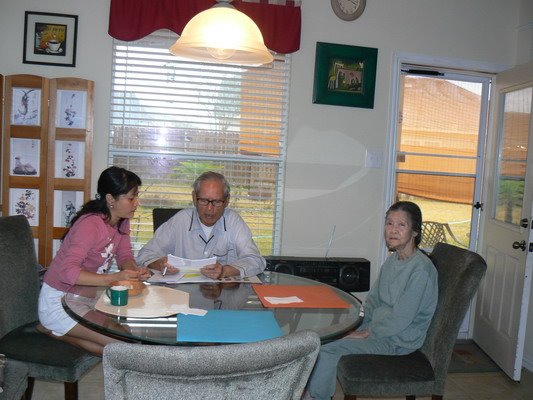THE STRANDED FISH
Doan Quoc Sy
Translation and Drawings by VO-DINH
Long ago there was a young soldier:
Wearing a conical spiked hat,
Yellow bag over his back,
Long gun on his shoulder,
His hands grasp lance and rifle,
The order comes:
He steps to the boat,
The drums thunder:
He steps down to the boat,
Tears wetting his young face like rain.
The trip up the river lasted for several days. Then the
passengers were told to disembark in order to take the land route. They
crossed streams, climbed mountains, took to other boats again, then
again leaving these, marched through the jungle. One month had passed
before they reached their isolated garrison. This was at the frontier
where day and night the sounds of rushing cataracts could be heard;
where the mountains were high and forbidding, one peak succeeding another
endlessly, barring the way home. Along both banks of the swift river
were dark and ancient forests infested with poisonous snakes and wild
beasts.
Poor soldier… he was so young and yet he had to stay here for
three years. Three long years to worry and yearn for home. Any day
something might happen and he would die in these grandiose but cruel
surroundings. If he went down a small leaf would be enough to cover his
body for well before the leaf rotted away his body would disintegrate
and disappear into the humid black mud, the underside of the jungle.
At night when the young soldier slept, such images rushed back
with the roar of the cataracts and filled him with fear. Three years…
three long years…
Three years of garrison life,
On guard at down, paperwork at night.
Trees are cut and sawed into lumber;
It was Fate, so who will complain ?
For food only bamboo shoots,
For friends, just bamboo trees.
In the clear blue water a little fish
Delightful and free…
One day, while looking for lumber, the young soldier lost his
way and chanced upon an area round and deep, crowded with rocks: there
were boulders, stones and pebbles as small as gravel. The water was
crystal clear and in it he saw a little fish. Quickly the fish darted
around and tried to take cover. But the homesick young soldier was only
thinking of his own wish to be free. So he sang
“In the clear blue water, a little fish delightful and free…”
Strangely enough the fish could reply. It asked the soldier:
- “You think I’m very happy in here, don’t you ?”
- “Yes,” answered the young soldier, “I do. You must be very happy in
there. It’s so peaceful and the water’s so clear. You’re all by
yourself… leisurely, free…”
The fish pretended to be laughing ironically, then went on explaining:
- “There used to be a beautiful stream here. One day it rained and
rained and rocks rolled down from the mountain, damming up the current.
The old stream changed its course and left this dead portion here. At
first when the water was still quite muddied, I felt all right. I swam
around and ate plenty paying attention to no one and no one knew I was
here. But slowly the water became clearer and clearer. By the time, only
one moon had gone by, the water became as clear as crystal and I felt
so ashamed. It’s not only unfortunate enough to get caught in a dead
stream, but to be stranded in such transparent, crystal clear water,
that’s very sad and very degrading.”
- “If the water’s clear, there’s not much to eat. Have you been going hungry ?” asked the young soldier.
- “I can eat the moss off these rocks.”
Take some rice bread out of his bag the soldier said:
- “Shall I break this into small pieces for you ?”
When it replied, the voice of the fish was tranquil but sad;
- “Thank you very much. If only the water were muddied… but it’s so
clear you could see me swimming about snapping up your rice. What a
humiliation ! What a humiliation !”
The young soldier stood in silence for a moment. Then he seemed to recall something:
- “Say, my friend, why not let me take you out of this place and carry you over to the river near by?”
The fish replied,
- “Thanks, really. But you see, if I let you take me in your hand
that’s ten thousand times more degrading than if I remain here in this
dead steam. Though I remain here, day and night I can hear the river and
feel its tremor through the veins of the earth. One day I’m sure… I’m
sure a great mountain rainfall will make this hole overflow and it will
flood that stream and then I will follow the current to the great river.
That will be beautiful… that will be beautiful !”
Sounds of the toscin reverberated through the jungle recalling
the soldiers to their barracks. Regretfully the young soldier bade the
fish farewell. From then on, whenever he was in the jungle, he tried to
keep away from the dead portion of the old stream so as not to disturb
the fish in its captivity and solitude. Once or twice when the mountain
rains came down very hard, he would run to the dead stream and throw a
handful of rice into the muddied water. But the young soldier’s heart
was not at peace for he could not help wondering if the fish was still
there to receive his gift or if it had already wriggled over the rocks
and found the great river of its dream…
CON CÁ MẮC CẠN
Ngày xưa có một người lính thú:
Ngang lưng thì thắt bao vàng,
Đầu đội nón dấu vai mang súng dài.
Một tay thì cắp hoả mai,
Một tay cắp giáo quan sai xuống thuyền.
Thùng thùng trống đánh ngũ liên,
Bước chân xuống thuyền nước mắt như mưa.
Đi ngược dòng sông vài ngày rồi lên bộ lẽo đẽo vượt suối, rồi lại xuống thuyền ngược dòng sông, rồi lại lên bộ, cứ như thế ròng rã một tháng trường mới tới nơi đồn trú.
Đó là miền biên giới có thác chảy ào ào suốt ngày đêm, có núi chập chùng cao ngất chắn mất đường về. Dọc theo ngọn nguồn con sông chảy xiết là những khu rừng già âm u nhiều rắn độc, nhiều thú dữ.
Đau đớn thay cho người lính thú, anh phải ở đây ba năm, ba năm dài những lo âu, thương nhớ. Bất trắc có thể xảy đến hằng ngày khiến anh bỏ thây nơi rừng núi hùng vĩ nhưng hiểm độc này. Anh mà ngã xuống chỉ một chiếc lá nhỏ cũng đủ phủ thây anh vì thân anh sẽ rữa nát trước chiếc lá để rồi mất tích vào đám bùn đen ẩm thấp dưới rừng. Đêm đến anh ngủ, những hình ảnh khủng khiếp đó ùa đến cùng tiếng thác nước để uy hiếp linh hồn anh. Ba năm… ba năm dài…
Ba năm trấn thủ lưu đồn,
Ngày thì canh điếm, tối dồn việc quan.
Chém tre đẵn gỗ trên ngàn,
Hữu thân hữu khổ phàn nàn cùng ai.
Miệng ăn măng trúc măng mai,
Những giang cùng nứa lấy ai bạn cùng.
Nước trong xanh con cá vẫy vùng.
Phải, một hôm kia anh vào rừng chém tre đẵn gỗ, anh lạc đến khoảng tròn rộng và sâu những đá là đá, lớn có từng tảng, nhỏ thành từng hòn, nhỏ nữa là cát sỏi. Nước ở đây thật là trong và có một con cá. Thoáng thấy anh, con cá vùng quẫy như muốn tìm nơi ẩn trốn. Người lính thú nào có biết điều đó, anh ao ước được tự do như con cá kia và buột lời ngâm:
Nước trong xanh con cá vẫy vùng…
Kỳ lạ thay, con cá đó biết nói. Nó hỏi anh:
- Anh cho là tôi sung sướng lắm sao ?
Người lính thú đáp:
- Sung sướng lắm chứ ! Cảnh thì tĩnh, nước thì trong, một mình anh thảnh thơi, vùng vẫy.
Con cá làm như tiếng cười mai mỉa rồi giải thích:
- Đây trước là con suối. Một hôm mưa nguồn lớn, đá trên núi xô lăn xuống ngổn ngang, con suối đổi dòng, để lại một khúc chết ở đây. Thoạt tiên nước đục, tôi còn khuây khoả đôi chút vì mình có thể bơi lội tung tăng mà vẫn có mồi, chẳng phải để ý đến ai, và cũng chẳng ai biết có mình mà để ý. Tai hại thay nước lắng dần… Qua đi một tuần trăng, nước trong suốt như gương, tôi thấy mình trơ trẽn quá. Anh ơi, rủi bị tù trong một vũng nước đã là một điều đáng buồn, lại bị tù lộ liễu trong một vũng nước trong suốt như gương này thật là vừa buồn vừa nhục.
- Nước trong vắt không có mồi, anh có đói không ?
- Tôi có thể ăn rêu bám ở những hòn đá quanh đây.
- Người lính thú lấy cơm nắm giơ lên và nói:
- Tôi bửa cơm ra rồi ném xuống một ít cho anh nhé.
Giọng cá bình thản một cách buồn rầu:
- Cám ơn anh, giá nước đục anh làm như vậy thì hay, nhưng nước trong như thế này anh ném xuống để thấy tôi bơi lên đớp lấy, chao ôi còn cảnh nào tủi hổ cho bằng.
Người lính thú ngẫm nghĩ, sực nhớ điều gì, anh nói:
- Thế tôi mang anh sang dòng sông gần đây vậy nhé !
Cá đáp:
- Cám ơn anh, nhưng cảnh tôi phải lên nằm trên lòng bàn tay anh để rồi anh mang ra sông thả xuống còn đáng sỉ nhục gấp ngàn vạn lần cảnh bị tù thế này. Tôi tuy bị tù ở đây nhưng vẫn nghe thao thức tiếng sông qua mạch đất. Sẽ có ngày mưa nguồn làm tràn bờ giếng này, làm dềnh khúc sông kia, lúc đó tôi sẽ nương theo triền nước mà tìm ra sông. Như thế mới đẹp ! Như thế mới đẹp !
Có tiếng mõ thu quân. Người lính thú chào cá, bịn rịn ra về. Từ đấy mỗi khi chém tre, đẵn gỗ, hoặc đi kiếm măng trúc măng mai qua đấy, anh cũng giữ ý chẳng muốn đến bên bờ suối chết để khỏi gây xao động cho con cá bị tù. Thảng hoặc gặp mưa nguồn khá lớn, anh chạy vội tới đó ném vội xuống khối nước đục ngầu một ít cơm rời, rồi ra về trong lòng không vui, vì anh vẫn thắc mắc chẳng hiểu cá còn ở dưới đó để nhận những hột cơm của người tri kỷ, hay đã trườn mình tìm ra sông rồi.
CON CÁ MẮC CẠN nguyên tác Doãn Quốc Sỹ,
bản dịch sang Anh ngữ Võ Đình,
minh hoạ Võ Đình,
ấn hành vào dịp kỷ niệm mười năm hoạt động 1962 –
1972
của nhà xuất bản SÁNG TẠO.
























































